|
|
|
Sort Order |
|
|
|
Items / Page
|
|
|
|
|
|
|
| Srl | Item |
| 1 |
ID:
181384
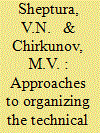

|
|
|
|
|
| Summary/Abstract |
This paper examines approaches to organizing the technical operation of communication equipment and automated control systems of the RF Armed Forces. It suggests ways to improve them further.
|
|
|
|
|
|
|
|
|
|
|
|
|
|
|
|
| 2 |
ID:
095013
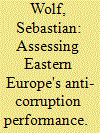

|
|
|
|
|
| Publication |
2010.
|
| Summary/Abstract |
This article compares the results of Council of Europe and Organisation for Economic Co-operation and Development (OECD) anti-corruption monitoring reports to two Transparency International instruments, the Corruption Perceptions Index and the OECD Anti-Bribery Convention Progress Report. It constructs and applies a simple typology (four-cell matrix) consisting of the combinations of good/deficient implementation of international anti-corruption provisions and high/low level of perceived corruption. As the sources and the comparative method used cannot prove causality, the article introduces three ideal types of interpretation to discuss the relevance of the anti-corruption regulatory framework in both domestic and cross-border anti-corruption policies. In the conclusion it is argued that there is a specific Eastern European pattern of anti-corruption performance that implies a need for new strategies.
|
|
|
|
|
|
|
|
|
|
|
|
|
|
|
|
| 3 |
ID:
083594
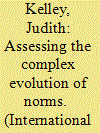

|
|
|
|
|
| Publication |
2008.
|
| Summary/Abstract |
Given that states have long considered elections a purely domestic matter, the dramatic growth of international election monitoring in the 1990s was remarkable. Why did states allow international organizations and nongovernmental organizations (NGOs) to interfere and why did international election monitoring spread so quickly? Why did election monitoring become institutionalized in so many organizations? Perhaps most puzzling, why do countries invite monitors and nevertheless cheat? This article develops a rigorous method for investigating the causal mechanisms underlying the rise of election monitoring, and "norm cascades" more generally. The evolution and spread of norms, as with many other social processes, are complex combinations of normative, instrumental, and other constraints and causes of action. The rise of election monitoring has been driven by an interaction of instrumentalism, emergent norms, and fundamental power shifts in the international system. By dissecting this larger theoretical complexity into specific subclaims that can be empirically investigated, this article examines the role of each of these causal factors, their mutual tensions, and their interactive contributions to the evolution of election monitoring
|
|
|
|
|
|
|
|
|
|
|
|
|
|
|
|
| 4 |
ID:
168197
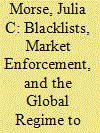

|
|
|
|
|
| Summary/Abstract |
This paper highlights how international organizations can use global performance indicators (GPIs) to drive policy change through transnational market pressure. When international organizations are credible assessors of state policy, and when monitored countries compete for market resources, GPIs transmit information about country risk and stabilize market expectations. Under these conditions banks and investors may restrict access to capital in noncompliant states and incentivize increased compliance. I demonstrate this market-enforcement mechanism by analyzing the Financial Action Task Force (FATF), an intergovernmental body that issues nonbinding recommendations to combat money laundering and the financing of terrorism. The FATF's public listing of noncompliant jurisdictions has prompted international banks to move resources away from listed states and raised the costs of continued noncompliance, significantly increasing the number of states with laws criminalizing terrorist financing. This finding suggests a powerful pathway through which institutions influence domestic policy and highlights the power of GPIs in an age where information is a global currency.
|
|
|
|
|
|
|
|
|
|
|
|
|
|
|
|
| 5 |
ID:
107253
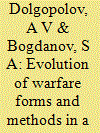

|
|
|
|
|
| Publication |
2011.
|
| Summary/Abstract |
In the authors' view, the systemic properties of information and communications network elements are used, where appropriate for the warfare system, in the network centric warfare environment, so as to change dramatically the concept of the nature of warfare and its main content - the forms and methods of warfare.
|
|
|
|
|
|
|
|
|
|
|
|
|
|
|
|
| 6 |
ID:
152055
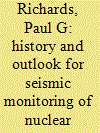

|
|
|
|
|
| Summary/Abstract |
Modern methods of nuclear-explosion monitoring are vastly more capable than they were when underground nuclear testing began in the late 1950s, in part because a cycle of improvements in explosion monitoring in the 1960–80 period led to improvements in monitoring for earthquakes and other phenomena, which then led to a general growth in monitoring assets that in turn has been applied back to explosion monitoring. Practical experiences in nuclear-explosion monitoring, acquired during the era of active testing prior to finalization of the CTBT text in 1996, laid the basis for monitoring in support of this arms-control initiative. This article elaborates on the future of nuclear-test-monitoring technology, which can build upon an additional and remarkable growth of general monitoring assets that began in the 1990s, largely unrelated to the specifics of nuclear-test monitoring. A new cycle of improvements in earthquake monitoring is likely to improve monitoring for explosions. While it is not easy to quantify the degree of monitoring improvement afforded by such new assets, an example from North Korea indicates the improvement can be substantial.
|
|
|
|
|
|
|
|
|
|
|
|
|
|
|
|
| 7 |
ID:
168196


|
|
|
|
|
| Summary/Abstract |
In recent decades, IGOs, NGOs, private firms and even states have begun to regularly package and distribute information on the relative performance of states. From the World Bank's Ease of Doing Business Index to the Financial Action Task Force blacklist, global performance indicators (GPIs) are increasingly deployed to influence governance globally. We argue that GPIs derive influence from their ability to frame issues, extend the authority of the creator, and — most importantly — to invoke recurrent comparison that stimulates governments' concerns for their own and their country's reputation. Their public and ongoing ratings and rankings of states are particularly adept at capturing attention not only at elite policy levels but also among other domestic and transnational actors. GPIs thus raise new questions for research on politics and governance globally. What are the social and political effects of this form of information on discourse, policies and behavior? What types of actors can effectively wield GPIs and on what types of issues? In this symposium introduction, we define GPIs, describe their rise, and theorize and discuss these questions in light of the findings of the symposium contributions.
|
|
|
|
|
|
|
|
|
|
|
|
|
|
|
|
| 8 |
ID:
139220
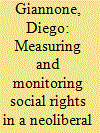

|
|
|
|
|
| Summary/Abstract |
The article aims to describe how the measurement and monitoring of human rights have been changed and weakened by the neoliberal resistance to social rights. In so doing, the study describes the political and ideological context which stimulated the broad conception of human rights included in the Universal Declaration of Human Rights. It then focuses on the ideological turn which occurred over the 1970s from welfare democracy to neoliberal democracy and the neoliberal approach to human rights. Based on a neo-Gramscian approach, the study considers political and ideological reasons as key in explaining both the rise and fall of social rights and the changes in their measurement. As a case in point, the article analyses the work of the UN in measuring and monitoring human rights. In spite of the use by the UN committees of indicators and guidelines aimed at measuring and monitoring the progressive realization of all human rights, results show that the reluctance of many states to implement social and economic rights makes UN efforts ineffective. Both states’ reluctance and instruments’ ineffectiveness can be ascribed to the neoliberal delegitimization of social rights, which is likely to persist in spite of the recent economic crisis.
|
|
|
|
|
|
|
|
|
|
|
|
|
|
|
|
| 9 |
ID:
095280
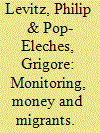

|
|
|
|
|
| Publication |
2010.
|
| Summary/Abstract |
Using cross-national governance indicators and evidence from a recent Bulgarian survey, this essay examines political reforms in Bulgaria and Romania since EU accession and, in particular, the 'backsliding' hypothesis-that these countries have abandoned or reversed the reforms they introduced in order to qualify for membership of the European Union. It finds no systematic evidence either that these countries have been backsliding or that their trajectories differ significantly from their first-wave Central and East European neighbours, though governance reforms have slowed after accession. The second part of the essay focuses on the mechanisms responsible for the lack of significant backsliding, emphasising the role of continued conditionality through the safeguard clauses, EU funding and increasing linkage between new and old EU members, including opportunities for East Europeans to work and travel in Western Europe.
|
|
|
|
|
|
|
|
|
|
|
|
|
|
|
|
| 10 |
ID:
108988
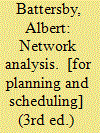

|
|
|
|
|
| Edition |
3rd ed.
|
| Publication |
London, McMillan and Co. Ltd., 1970.
|
| Description |
ix, 332p.Hbk
|
|
|
|
|
|
|
|
|
|
|
|
Copies: C:1/I:0,R:0,Q:0
Circulation
| Accession# | Call# | Current Location | Status | Policy | Location |
| 005767 | 658.4032/BAT 005767 | Main | On Shelf | General | |
|
|
|
|
| 11 |
ID:
165618
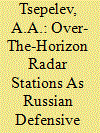

|
|
|
|
|
| Summary/Abstract |
The author examines issues of employment of over-the-horizon radar stations as one of the elements of the information subsystem of monitoring aerospace to detect various targets.
|
|
|
|
|
|
|
|
|
|
|
|
|
|
|
|
| 12 |
ID:
179327


|
|
|
|
|
| Summary/Abstract |
How can we make sure that states do not only sign international anti-corruption conventions, but also comply with them once the ink has dried? Peer review among states offers one answer to this question. This article develops a theoretical framework to study the different processes and mechanisms through which peer reviews can contribute to state compliance. It focuses on three processes: transparency, pressure, and learning. The article subsequently applies this framework to the OECD Working Group on Bribery (WGB) in order to identify how far participants in this peer review perceive the WGB as capable of organising these processes, and to what extent they consider these processes relevant for promoting state compliance. Data come from an online survey (74 observations) and 17 in-depth interviews. The findings reveal that this peer review exercise is perceived as effective in creating transparency about state behaviour, mobilising pressure, and stimulating learning. However, the extent to which these processes can promote compliance is more limited. For these processes to work, political will is crucial.
|
|
|
|
|
|
|
|
|
|
|
|
|
|
|
|
| 13 |
ID:
140636


|
|
|
|
|
| Publication |
London, McGraw-Hill, 1971.
|
| Description |
ix, 273p.hbk
|
| Standard Number |
070942285
|
|
|
|
|
|
|
|
|
|
|
|
Copies: C:1/I:0,R:0,Q:0
Circulation
| Accession# | Call# | Current Location | Status | Policy | Location |
| 008254 | 658.4033/ANS 008254 | Main | On Shelf | General | |
|
|
|
|
| 14 |
ID:
187135
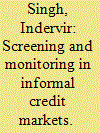

|
|
|
|
|
| Summary/Abstract |
The present article examines the screening and monitoring strategies used by lenders to solve the problem of imperfect information in the rural informal credit market. The study uses data from a primary survey conducted in Punjab, India. The survey focuses on informal lending between commission agents and farmers. Data were collected from 120 randomly selected commission agents from four blocks. Each of the blocks represents a different development level. The results show that commission agents invested significant time and resources for screening and monitoring the farmers. The screening and monitoring were found to be more stringent in areas that were underdeveloped and had higher default risk. Commission agents could shift a significant share of the screening cost to the borrowers, thereby increasing their self-enforcement range. The study argues that high screening cost hurts small farmers. The regression results found a significant reduction in the default rate and the unrecovered loan due to screening strategies.
|
|
|
|
|
|
|
|
|
|
|
|
|
|
|
|
| 15 |
ID:
091239
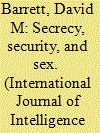

|
|
|
|
|
| Publication |
2009.
|
| Summary/Abstract |
Congressional monitoring of intelligence activities has always been somewhat controversial, but its roots go back to the founding era of the United States, when the new Constitution gave both the President and Congress important roles in foreign affairs.
|
|
|
|
|
|
|
|
|
|
|
|
|
|
|
|
| 16 |
ID:
142610


|
|
|
|
|
| Summary/Abstract |
This article analyzes how the conflict environment in which a civilian monitoring mission is deployed influences the monitors' assessment of the operation. It draws on unique empirical material from the experience of the Sri Lanka Monitoring Mission (SLMM), deployed to oversee a ceasefire agreement in Sri Lanka 2002–2008. With material from a survey and in-depth interviews, experiences of the monitors are analyzed and changes over time are traced in relation to the monitors' assessment of the mandate and organizational set-up of the mission. The study points to the difficulty of monitoring missions to address escalation during an ongoing peace process. Its function is dependent on the goodwill of the parties. In essence, monitoring missions have the potential to strengthen peace when there is momentum in favor of progress, but when relations between the parties turn sour and the conflict escalates a civilian monitoring mission basically loses its potential. During the final stages of the war, which saw a very large number of civilian casualties, the war-torn areas were closed to international observers. Moreover, international pressure for a short-term ceasefire to alleviate the humanitarian situation was dismissed by the Sri Lankan government, which also saw the backing of several important actors, not the least China.
|
|
|
|
|
|
|
|
|
|
|
|
|
|
|
|
|
|
|
|
|